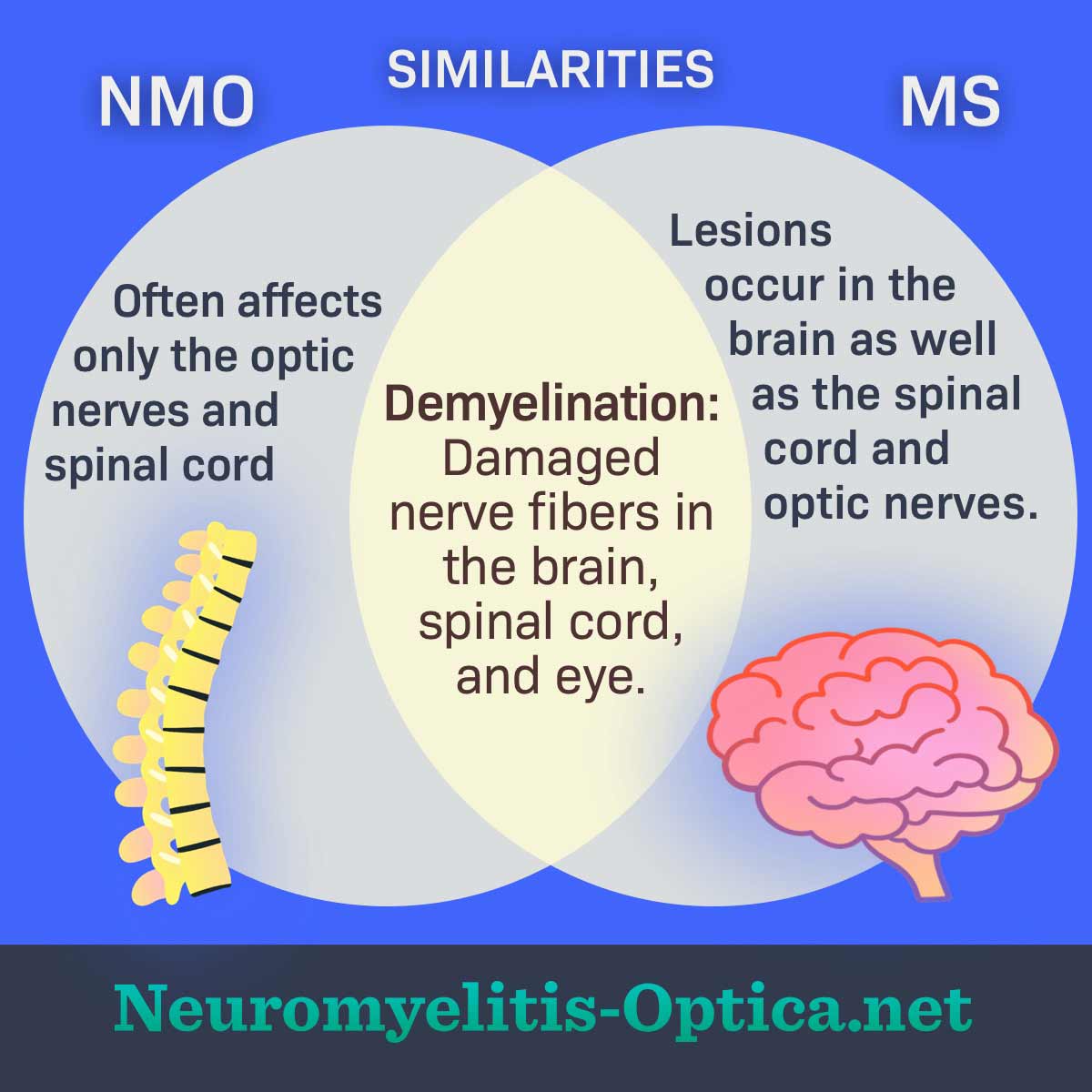Common Misdiagnoses: MS and NMO
Reviewed by: HU Medical Review Board | Last reviewed: February 2023 | Last updated: April 2024
Neuromyelitis optica spectrum disorder (NMO) and multiple sclerosis (MS) are 2 diseases with some similar symptoms. NMO is very rare. So, it is sometimes misdiagnosed as MS. One study estimated that about 7 percent of NMO cases were first diagnosed as MS.1-3
What is NMO?
NMO is a chronic (long-term) autoimmune condition. In autoimmune conditions, the immune system attacks the body by mistake. In NMO, the immune system attacks a protein called aquaporin-4 (AQP4) in the central nervous system (CNS). The CNS contains the:1
- Brain
- Spinal cord
- Eye nerves
This attack leads to swelling and inflammation in the CNS. Symptoms of NMO include:1
- Vision problems or eye pain
- Weakness or numbness
- Difficulty walking or paralysis
- Loss of bowel or bladder control
- Stiffness, pain, or tingling in the legs and arms
NMO is a relapsing disease. That means attacks come and go and symptoms may improve between attacks. There may be weeks to years between attacks. Treatment focuses on preventing attacks because they can cause permanent damage.1
What is MS?
MS is also a chronic autoimmune disease. In MS, the immune system also attacks the CNS. But it targets different parts than NMO does.4
Nerve fibers in the body have a protective cover called myelin. When myelin is damaged, nerve signals can be impacted. With MS, the immune system attacks myelin and the cells that make it.4
Symptoms of MS include:4
- Vision problems or eye pain
- Weakness or numbness
- Difficulty walking or paralysis
- Loss of bowel or bladder control
- Stiffness, pain, or tingling in the legs and arms
- Depression or emotional changes
- Tiredness
- Memory or focus problems
How are NMO and MS alike?
Figure 1. A chart breaking down the similarities and differences between NMO and MS
NMO and MS can both cause damage to the myelin. This makes them both demyelinating diseases. In MS, the immune system specifically targets the myelin. In NMO, other damage to the CNS can harm the myelin. In both diseases, the damage can cause:1,2
- Weakness and numbness
- Difficulty walking
- Difficulty seeing
- Loss of bowel or bladder control
- Pain
Both MS and NMO can cause damage to nerve fibers in the CNS. This damage results in lesions. These lesions will show up on imaging studies such as magnetic resonance imaging (MRI).1,2
Lesions in NMO and MS can be in different places. NMO often only causes lesions in the eye nerve, spinal cord, and brain stem. MS lesions occur in the eye nerve and spinal cord as well as other places in the brain.2
What are the differences?
There are differences between MS and NMO. For example, NMO tends to impact both eyes at the same time, while MS often only targets 1 eye at a time. NMO attacks are usually more severe with less improvement in symptoms afterward compared to MS attacks.1
Unlike MS, NMO is usually not progressive. This means that NMO does not get worse over time between attacks. Some people with MS may have worsening of symptoms even without clinical attacks and new lesions. NMO also usually does not cause cognitive (thinking) changes, like worsening memory.1
Because NMO and MS have similar symptoms, NMO can be misdiagnosed as MS. Some doctors even believe anyone diagnosed with MS should be tested for NMO.1,2
With NMO, the body produces extra antibodies called anti-AQP4. Antibodies are proteins the body’s immune system makes to kill germs. But in NMO, they attack AQP4. So part of an accurate NMO diagnosis involves testing for anti-AQP4 antibodies.1,5
Who gets NMO and MS?
NMO is much rarer than MS. About 4,000 to 8,000 people in the United States have NMO. In contrast, about 1 million people in the United States have MS. NMO and MS are both more common in women. NMO is more common in non-white people. MS is most common in people of white European descent.1,4
